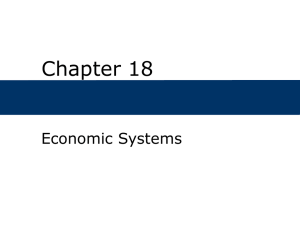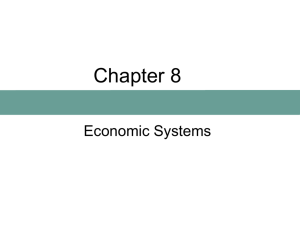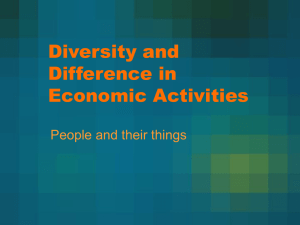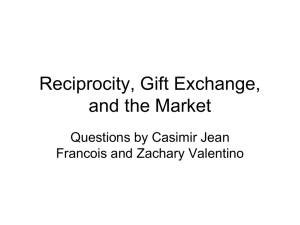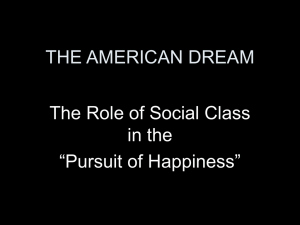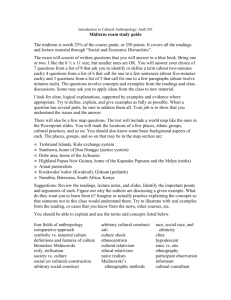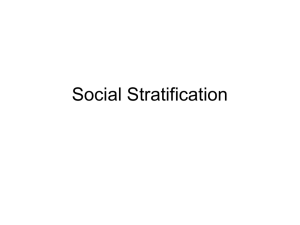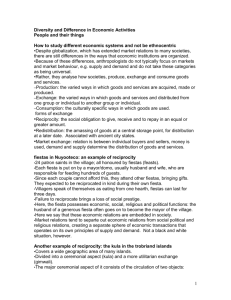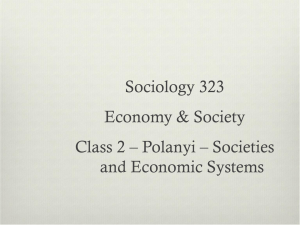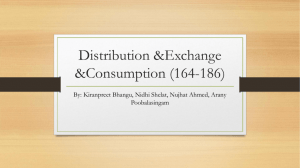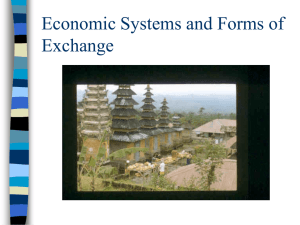Economic Systems Part II
advertisement
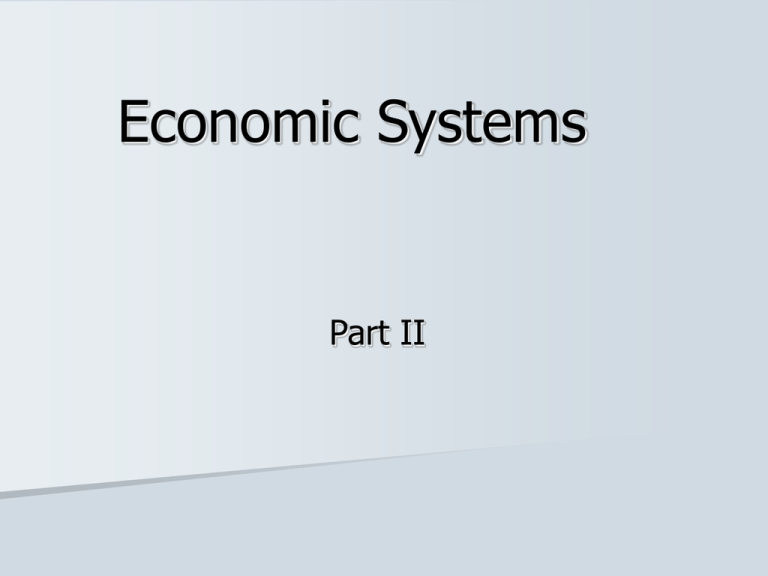
Economic Systems Part II Modes of Distributing Goods Reciprocity: the exchange of goods and services, of approximately equal value, between two parties 2. Redistribution: a form of exchange in which goods flow into a central place, where they are sorted, counted, and reallocated 3. Market exchange: the buying and selling of goods and services, with prices set by rules of supply and demand 1. Reciprocity Generalized – a mode of exchange in which the value of what is given is not calculated and repayment is not specified. Balanced –a mode of exchange in which the giving and receiving are specific as to the value of the goods and the time of their delivery. Negative – a form of exchange in which the aim is to get something for as little as possible. Ju/’hoansi Distribution These Ju/’hoansi are cutting up meat that will be shared by others in the camp. Food distribution practices of such food foragers are an example of generalized reciprocity. Barter and Trade Barter occurs when two or more partners from different groups negotiate a direct exchange of one trade good for another. Neither fair nor balanced, it may involve hard bargaining, manipulation, and outright cheating. Although in barter each party seeks to get the best possible deal, both may negotiate until a relative balance has been found, and each feels satisfied at having achieved the better of the deal. The Kula Ring The ceremonial trading of shell necklaces and armbands in the Kula ring encourages trade throughout Melanesia. The Kula Ring In Melanesia, men of influence paddle and sail within a large ring of islands in the southwestern Pacific off the eastern coast of Papua New Guinea to participate in the ceremonial trading of Kula shells, which smoothes trade relations and builds personal prestige. Redistribution In societies with a sufficient surplus to support some sort of government, goods in the form of gifts, tribute, taxes, and the spoils of war are gathered into storehouses controlled by a chief or some other type of leader. From there, they are handed out again. Motives in Redistributing Income The leadership has three motives in redistribution: 1. Gain or maintain a position of superiority through a display of wealth and generosity. 2. Assure those who support the leadership an adequate standard of living by providing them with desired goods. 3. Establish alliances with leaders of other groups by hosting them at lavish parties and giving them valuable goods. Conspicuous Consumption A term coined by Thorstein Veblen to describe the display of wealth for social prestige. Potlach A ceremonial event in which a village chief publicly gives away stockpiled food and other goods that signify wealth. Here we see Tlingit clan members dressed in traditional Chilkat and Raven’s Tail robes during a recent potlatch in Sitka, Alaska. Prestige Economy and Leveling Mechanism Prestige Economy: creation of a surplus for the express purpose of gaining prestige through a public display of wealth that is given away as gifts. Leveling Mechanism: a societal obligation compelling a family to distribute goods so that no one accumulates more wealth than anyone else. Market Exchange Buying and selling of goods and services, with prices set by rules of supply and demand. Its critical attributes are: – – – – – durability portability divisibility recognizability fungibility. Money Anything used to make payments for other things (goods or labor) as well as to measure their value; may be special purpose or multipurpose. Visual Counterpoint In many societies, the market is an important focus of social as well as economic activity, as shown in the photo of a crowded outdoor marketplace in Aswan, Egypt. In contrast,the packer pictured on the left works at an Amazon.com distribution center in Fernley, Nevada, preparing orders purchased on the Internet. World Trade Organization Established in 1995 and headquartered in Geneva, the WTO is the only global international organization with rules of trade among its 150 member countries. Informal Economy The production of marketable commodities that for various reasons escape enumeration, regulation, or any other sort of public monitoring or auditing. Review on Wednesday, Chapters 7 and 8 Writing Day on Thursday – Use this time to work on your Ethnographic paper and/or your Research Paper – I will be available in my office IB2324C Ethnographic Paper due on Friday – Final copy should include cover page, 250 word abstract, and 2-3 page paper – Spell check, proof-read and keep it uniform in style Quiz #3 on Friday, Chapters 7 and 8 Fill out Aryana Bates’ survey for our class
